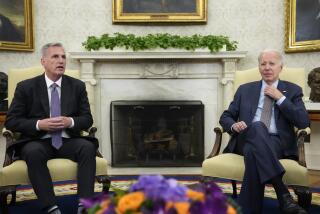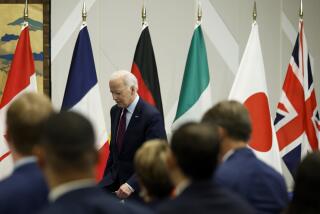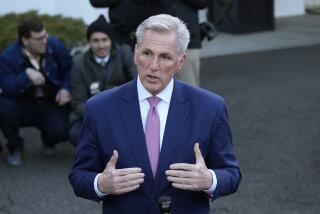Will Also Negotiate With Democrats in Congress, He Says : Bush Pledges to Take Lead on Reducing Deficit
- Share via
WASHINGTON — President-elect George Bush said Thursday that he will “take the lead on the budget deficit question,” offering his most definitive statement since the election that once in office he will present his own budget-balancing proposals. He also expressed a willingness to negotiate with the Democratic majority in Congress.
Bush’s statement on the budget, made after a breakfast with Sen. George J. Mitchell (D-Me.), the newly elected Senate majority leader, went beyond his assertion to Republican governors last week that on the first day of his presidency he would appoint negotiators to represent his Administration in budget talks with Congress.
His new pledge came amid growing pressure on Bush to agree to present specific ideas for budget savings rather than negotiating based on President Reagan’s proposed budget and Democratic options for trimming the anticipated $155-billion federal deficit.
Brief Session With Reporters
In what has become an almost daily practice--and one that sharply contrasts with that of Reagan--Bush engaged in a brief question-and-answer session with reporters.
With Mitchell at his side outside the White House, Bush expressed confidence that he and the Democratic leader “can work together,” although he said: “I’m not naive about it, nor is he. There will be different approaches on some of these major problems facing the country.”
Bush also defended the seemingly stalled pace of his effort to fill the senior positions in his Administration.
“I will move on certain key appointments fairly soon,” he said. But, he also said: “I’m going to need some time on some of these appointments.”
And one transition staff member, summarizing a recent meeting of Bush with his transition advisers, said the President-elect made it clear that “we may end up using the full clock on some of these appointments.”
No Sign of Progress
As the end of the week arrived, there was no sign of progress in naming senior officials for the Cabinet departments or at the White House itself. Nor was there any apparent sense of urgency.
Gov. John H. Sununu of New Hampshire, whom Bush has named as his White House chief of staff, went on a skiing vacation in Colorado after a dinner meeting earlier in the week at which he tried to work out a top-level White House role for Robert Teeter, a longtime and particularly influential Bush political adviser.
One well-placed transition source, speaking on condition of anonymity, said Teeter appeared ready to accept a senior position in the White House, although the scope of his responsibilities remains uncertain.
The source, in an account disputed by Sununu aides, said that Teeter sought authority over policy and communications offices in the White House and direct access to Bush but that Sununu balked at such an arrangement.
With Brent Scowcroft set to return to the White House as the President’s national security adviser, the most important policy jobs and image-building positions would thus have been out of Sununu’s hands, substantially diluting his authority.
A Sununu aide who asked to remain anonymous termed the account of the talks inaccurate but declined to elaborate.
Meanwhile, Republican sources worried that Bush’s delay in revealing his choice for secretary of defense has undermined former Sen. John Tower (R-Tex.), said by most transition sources to be the President-elect’s top choice for the post.
The transition source said the FBI, which investigates the backgrounds of likely Cabinet nominees, is now checking on Tower--an apparent indication, the source said, that the Texan remains the front-runner.
But the longer Bush waits to announce his decision, several Republicans said, the longer critics will be able to build their case against the former chairman of the Senate Armed Services Committee. Tower has served as a consultant to five major defense contractors since leaving the Senate. And, as chairman of the Armed Services Committee, he developed a reputation among critics as an ally of the Pentagon who was insufficiently aggressive in monitoring the Defense Department’s budget requests.
In addition, sources inside and outside the government have raised questions about Tower’s personal life, noting that marital infidelity was charged in his acrimonious 1987 divorce from Lilla Burt Cummings. The Bush transition team said it would be particularly sensitive to the “character issue” in screening candidates for senior posts.
The former senator, one Republican who served in the Reagan White House said, is suffering “the death of a thousand cuts.”
“Either Bush has decided he doesn’t want him and is letting him hang out there (or) if that’s not the vice president’s intentions, then clearly they’re letting this drag on too long. Time doesn’t help Tower,” he said.
For his part, Bush indicated that he recognizes the problem, telling reporters when he met Mitchell that “any time there seems to be stories that may be hurtful to somebody, it concerns me no matter who it is. Sen. Tower’s a friend of mine but he knows that the process takes a while to go forward.”
Series of Meetings
Bush spent the day in a series of meetings after his 55-minute breakfast with Mitchell in the vice president’s office. He joined Reagan in a meeting with the President’s Foreign Intelligence Advisory Board, took part in Reagan’s meeting with Japanese Foreign Minister Sosuke Uno, had lunch with the President and sat in on a briefing that U.S. Trade Representative Clayton K. Yeutter conducted for Reagan.
Bush and Reagan spoke Thursday night at a testimonial dinner for retiring Rep. Jack Kemp of New York. In his tribute to Kemp, his first rival for the GOP nomination, Bush said: “We’re all of us in your debt and I for one will never forget it.”
Reagan called Kemp “one of the deputies” who helped him institute supply-side economics when he came to power in 1981. He called Kemp an unstinting fighter for conservative values and said Bush will need only to “sound the trumpet” when he needs support and “the great army of idealists and activists we have counted on will be ready to charge.”
“When you talk about Jack, one word comes to mind: the cause,” Reagan said. “Wherever he is, he will fight for that cause, he will work for that cause, and what unites every single person in this room is our shared commitment to that cause.”
Reflecting his continuing effort to reach out to political rivals, Bush today planned to meet with the Rev. Pat Robertson, another candidate for the Republican nomination, and then to welcome Gov. Michael S. Dukakis of Massachusetts, the Democratic presidential nominee, to the vice president’s house for an afternoon visit. He also planned to meet with conservative campaign supporters and with President Raul Alfonsin of Argentina.
More to Read
Sign up for Essential California
The most important California stories and recommendations in your inbox every morning.
You may occasionally receive promotional content from the Los Angeles Times.












